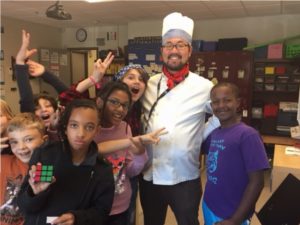Un Proyecto Del Libro De Cocina “The Cookbook Project” (2016)
Food. It’s the gateway into culture, people, and language. In many ways, food is the common vernacular of the people and has a reach-potential that goes beyond lingual boundaries. In an effort to get my students to be bold and venture into the world of the unfamiliar (and there’s nothing wrong with the familiar) and to push them to realize the value in other cultures (and there’s certainly nothing against our American culture), I try introducing our students to things like plantains, rambutan, tomatillos, yucca, and arepas. When I introduce our friends to these strange and foreign items, they look askance at me with raised eyebrows and question:
“What is that THING, and why do you want ME to try it?”
But after the guinea pig of a valiant classmate (who will eat just about anything) gives high accolades (and is apparently still alive after taking the initial bite), it only takes a few nudges for the reservations to subside. Students are asking (perhaps BEGGING) to try each others’ dishes that they prepared for this cookbook project. Hands crisscross as they reach over to grab a few more yucca fries, or dip their chips in the tomatillos “on fire” (en fuego) salsa, or down a gulp of the rambutan shake. It’s a transformative occasion when students realize that they have opened themselves up to culture unlike theirs and tastes that speak a familiar tune yet is otherworldly at the same time.
While the Spanish lesson underlying this whole cookbook project was the grammatical structure known as the imperative form (commands) like “Stir this,” “Chop this,” “Fry that,” the hook (and perhaps the real intent) was exposing our students to the language of food. This endeavor created opportunity for students to drink up (at times literally) the culture of a people different than theirs in an effort to help them understand the other better. A world language class like Spanish affords such opportunities to explore other cultures. And if the language of the people is the key that unlocks the culture, so to speak, the culture’s diverse food is one of the awesome treasures waiting to be discovered.
This project allowed our students to engage in authentic experiences and connect the dots between food, culture, and people. We began our journey dining at and talking to Lis Hernandez, the owner of Arepa Mía, a Venezuelan restaurant in Decatur. The students ordered in Spanish and conversed with Lis and had a personal Q & A with her. Some students had arepas for the first time; they learned about Venezuelan food and heard about Lis’ immigrant story to the United States. The students then took to Your Dekalb Farmers Market to practice the imperative form by completing a scavenger hunt that required our students to “Find this,” “Look for that,” “Write down that,” or “Shake this person’s hand.” This exercise allowed our students to practice this grammatical structure in a fun and meaningful way. An integral wrap-up to this learning experience entailed the creation of a recipe featuring an ingredient that originated from a Spanish-speaking country. They researched a recipe that would be easy for a middle school student to execute (possibly with the help of mom or dad), and they created a dish to share in class and contribute to our cookbook. Students also wrote opinion pieces on their dishes while outlining a basic step-by-step recipe using the imperative forms in Spanish.
This cookbook project brought a lot of smiles to our students’ faces as they ventured out, often stumbling and fumbling over their Spanish, but with a willingness to be brave and open. They made a friend in Lis who exposed our students to new smells, tastes, and flavors. Our students also got strange looks from market shoppers as they literally scavenged the premises with a Spanish dictionary in hand trying to figure out what I was asking them to accomplish. But as our students shared their recipes and dishes on our last day, there was a sense among our students that food matters because people, culture, and language matter. The next time our students find themselves in a foreign place, my hope is that they make a beeline for the closest eatery or market because these places are often the places that foster openness, friendships, and meaningful learning.
By Brian Ryu
Brian teaches 7th and 8th grade Spanish as well as 5th grade math, and he is enthusiastic about project-based learning and opportunities for students to try new foods from different cultures.
